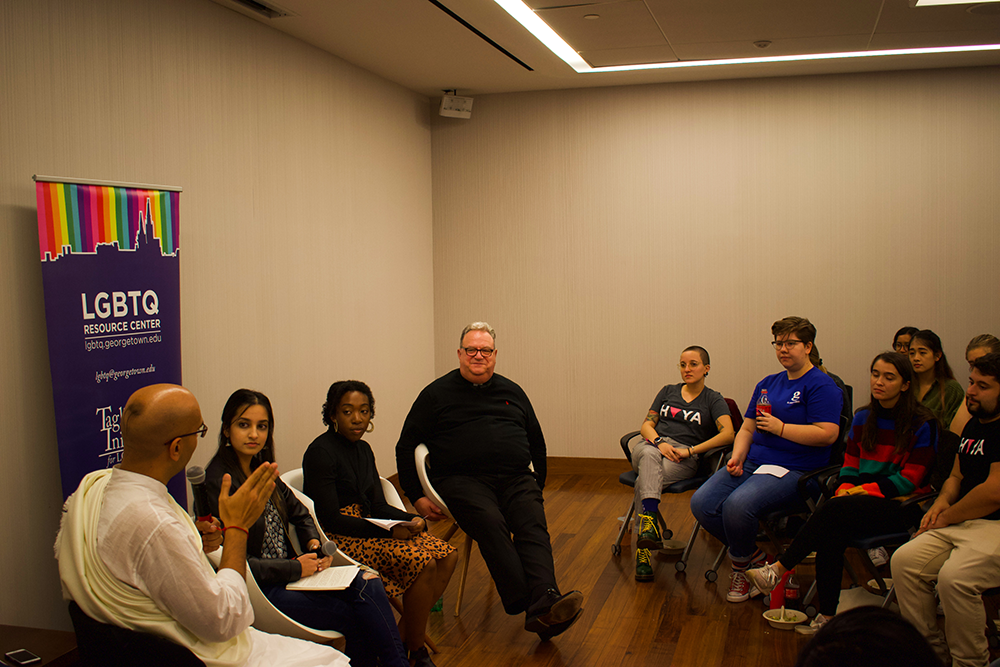Religious communities inadequately confront sexuality, alienating their members, students and religious leaders said at a Nov. 6 panel hosted by the LGBTQ Resource Center and Campus Ministry.
The event, “Desire, Pleasure, & Faith: A Conversation,” featured the Director for Dharmic Life Brahmachari Sharan and Senior Research Fellow at the Berkley Center for Religion, Peace, and World Affairs Jerry McGlone S.J. Students Mariah Johnson (COL ’21) and Saisha Mediratta (SFS ’20) shared their perspectives on sexuality, abstinence and chastity in the Healey Family Student Center Herman Meeting Room.

The event was a part of OUTober, a month-long set of programs sponsored by the LGBTQ Center during LGBTQ History month in October and November. Other events coordinated with Campus Ministry included a tea with Campus Ministry chaplains on Oct. 1 and a Mass of Belonging held at Dahlgren Chapel on Oct. 20.
Mediratta, whose family is Punjabi, said that early cultural experiences shaped her understanding of sexuality.
“Growing up we did not talk about sex, pleasure, the in-between, or even really dating,” Mediratta said. “My deepest struggle with navigating a journey around my life, my body and my choices is my very Indian family where faith, tradition and culture are so deeply intertwined, but it was self-policing in a tradition where we do not talk about these issues openly yet obsess over them covertly.”
Dharmic traditions, which include religions like Hinduism, Buddhism, Jainism, and Sikhism, have a wide range of beliefs and teachings on sex. Those beliefs have changed throughout history because of colonial influences and changing social norms in South Asia, according to Sharan.
Johnson, who was raised Catholic, did not engage in conversations about sexuality with family and was encouraged to practice abstinence throughout childhood, Johnson said.
“I didn’t really process what I was taught about abstinence and dating super deeply throughout adolescence but these views did stay with me, largely unquestioned, until college,” Johnson said. “When I started to learn more and more about myself here at Georgetown I started to question more and more why I believed so strongly in abstinence.”
Rigid Catholic teachings on sexuality present a dilemma for people who support the LGBTQ community, according to McGlone. The struggle for many Catholics is how to disagree thoughtfully with the aspects of doctrine that one feels are not essential to the faith, McGlone said.
The event was organized to facilitate a dialogue between students and religious leaders, according to Shiva Subbaraman, the director of the LGBTQ Resource Center. Provoking discussion around issues of sexuality is especially important for building trust with members of Campus Ministry, Subbaraman said.
“Part of the struggle they have as monks and priests is students look at them and they don’t trust them,” Subbaraman said in an interview with The Hoya. “Part of my hope was not only to have the students think through this but to demystify them to say they’re human, they struggle, they have always struggled and it’s okay to ask them these questions or share with them.”
Contemporary norms around sexuality have been shaped by antiquated religious teachings, Sharan said.
“The way we were socialized was to look at books made expressly for nuns and monks and make people think that was how we were supposed to be, which is ridiculous,” Sharan said.
Lack of familial and societal conversations around sex and spirituality can be harmful to well-being, according to McGlone.
“We understand the role religion can play in harming individuals but also the possibility of making and supporting health,” McGlone said. “This is not just a faith problem — this is a societal problem if we don’t talk about sexuality in this open and honest way enough.”
This article was updated June 26 at 12:52 p.m.




















